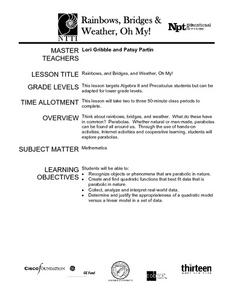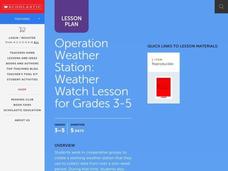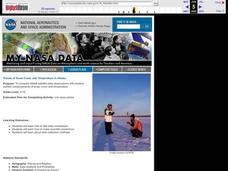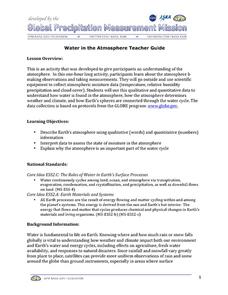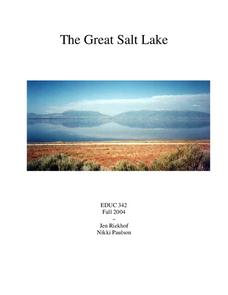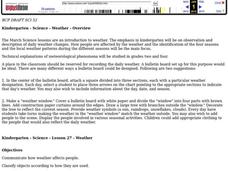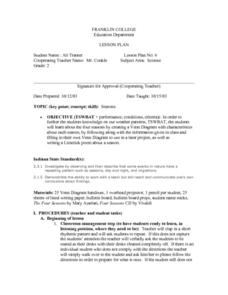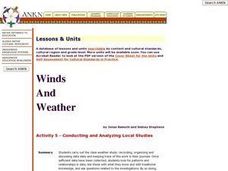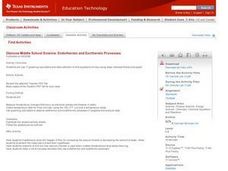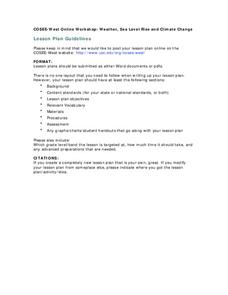Curated OER
Rainbows, Bridges & Weather, Oh My!
Explore how real-world applications can be parabolic in nature and how to find quadratic functions that best fit data. A number of different examples of modeling parabolas are explored including a student scavenger hunt, the exploration...
Curated OER
Cricket Weather
In this collecting data worksheet, 4th graders use the data collected on crickets chirps and the temperature to make a line graph by following 4 directives.
Curated OER
Operation Weather Station
Young scholars work in cooperative groups to create a working weather station. Tkey use the weather station to collect weather data over a one-week period. Students compare the data from their weather station to actual weather...
American Museum of Natural History
Make Your Own Weather Station
Scholars build a weather station equipped with a wind vane, rain gauge, and barometer. Following an informative page about the weather, learners follow steps to build their pieces then turn into meteorologists to chart the weather they...
Teach Engineering
Weather Basics
Weather — there's more to it than meets the eye of the storm. With this resource young meteorologists learn about the basics of weather, including information about the factors that influence the weather, common weather vocabulary,...
Curated OER
Trends of Snow Cover and Temperature in Alaska
Students gather historical snow cover and temperature data from the MY NASA DATA Web site. They compare this data to data gathered using ground measurements from the ALISON Web site for Shageluk Lake. They graph both sets of data and...
Curated OER
Water in the Atmosphere
A slide show serves as the backdrop for a lesson on the moisture in Earth's atmosphere. Through it, mini meteorologists learn about the attributes of the atmosphere and actually use data-collecting weather tools to make observations and...
Curated OER
Differences between Climate and Weather
Students collect weather data over weeks, graph temperature data and compare the temperature data collected with averaged climate data where they live.
Curated OER
Weather Tracking
Second graders use the internet to locate weather reports. They present data collected to the class through poster presentation. They read aloud the book Cloudy with a Chance of Meatballs by Judi Barrett and answer questions about...
Curated OER
Weather
Students communicate how weather affects people, classify objects according to how they are used, and observe and record weather data using symbols.
Curated OER
Weather With a Latitude
Learners read the temperature from a thermometer. In this weather lesson, students read a thermometer and record the temperature at twenty minute intervals. Learners discuss results.
Curated OER
Weather Predictions
Students record weather data and create a five day forecast. Students investigate the roles of meteorologists and identify symbols used on a weather map. After gathering weather data for a week, students will create a five day forecast...
Curated OER
Weaving Weather Maps with the World Wide Web
Students access the Internet and use real time data from the American Meteorological Society to create a detailed weather map. They make weather predictions based on the data collected.
Curated OER
Weather Patterns
Fourth graders collect and chart weather data over the course of the school year either using tools at school or media resources. They agree on weather terms to use in their observations and write them on the assigned sheet. Finally,...
Curated OER
Conducting and Analyzing Local Studies
Students carry out the class weather study: recording, organizing and discussing data daily and keeping track of this work in their journals. They look for patterns and relationships in data, link these with what they know and with...
Science 4 Inquiry
Fluid Streams Affecting Weather
The jet stream can reach speeds of up to 250 miles per hour. Scholars learn about the jet stream and ocean currents as they rotate through stations. They answer questions leading them to understand the impact these fluid streams have on...
Texas Instruments
Endothermic and Exothermic Processes
Students investigate temperature using the TI. In this chemistry lesson, students analyze the change in temperature, as chemicals are dissolved in water. They analyze data collected using the CBL 2.
Curated OER
Clam Shell Data Collection Sheet
In this clam shell data worksheet, students collect clam shells and identify their length, width, and if they have holes and not. They indicate the weather, wind direction, tidal stage, surface conditions, and beach conditions at the...
National Wildlife Federation
Why All The Wiggling on the Way Up?
Some of the CO2 emitted by burning fossil fuels is removed from the atmosphere by natural sinks, such as the ocean. The fifth engaging lesson in the series of 21 examines the CO2 data from three very different locations. It then makes a...
Curated OER
Watch the Sky: Observing Clouds and Patterns
Students observe clouds outside of the classroom. In this weather lesson, students investigate and record the clouds above their classroom everyday for three weeks. The students then analyze their data and discuss what causes specific...
Curated OER
Weather, Sea Level Rise and Climate Change
Eighth graders compare and contrast weather and climate. In this earth science lesson, 8th graders research weather data site and analyze historical data. They present their findings in class and explain identifiable trends.
Curated OER
Understanding Weather and Climate Patterns
Students research the climate patterns of various locations and make predictions based on their findings. They determine the importance of latitude and longitude in weather and climate. Students create graphs displaying their collected...
Alabama Learning Exchange
Weather Detectives
Second graders make weather observations and record data. They use the internet to get data on the weather. After 5 days students predict the weather for the next 3 days.
Curated OER
Weather Tools of the Trade
Fourth graders study the basic meteorological instruments (thermometer, barometer, weather vane, anemometer, and rain gauge). They explore how they are used, data that can be collected from them, and why records of the data are kept.


